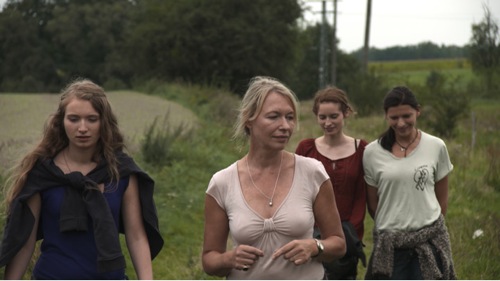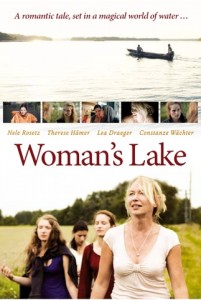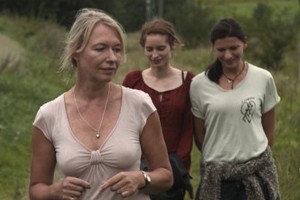Four Women. One Weekend. One Magical Landscape.

“Frauensee,” or “Woman’s Lake”, is a German independent film about two lesbian couples that aims to display the dividing lines between love, trust and understanding. Written and directed by Zoltan Paul, this film has debuted in eleven major queer film festivals around the world.
Rosa (Nele Rosetz), a fisherwoman and guardian of three lakes in the German countryside, lives a quaint and charming life with her partner Kirsten (Therese Hämer), a notable architect in Berlin. Rosa starts the film with a somber attitude as she aches for love both on the water and within her relationship. Conversely, Kirsten craves a successful life in which she is free to make decisions based on rationale as a way to escape from emotion. The two are complete opposites in both their demeanor and professional ambitions.
On a day, which could be any day, Rosa randomly meets two college students, Evi (Lea Draeger) and Olivia (Constanze Wächter), who share multiple parallels with the aforementioned couple. Both their aesthetic qualities and their personal goals match Rosa and Kirsten’s. Olivia chooses a life of business, operating from a rational mindset while Evi is more carefree in her undertakings, studying only a few courses so that she can travel the world. Upon being invited to Kirsten’s bungalow for a few wonderfully whimsical nights, these two couples rediscover and reinvent their lives.
 As with many independent films, viewers could initially find discontent in the slow progression of the movie. American audiences have been heavily influenced by short shot lengths, which give the impression of a fast paced movie, however sluggish the storyline might be. Nonetheless, by employing longer shot-lengths and beauteous imagery of lakeside life, Paul presents the viewer with his personal artistic vision, a normalcy that is difficult to contrive.
As with many independent films, viewers could initially find discontent in the slow progression of the movie. American audiences have been heavily influenced by short shot lengths, which give the impression of a fast paced movie, however sluggish the storyline might be. Nonetheless, by employing longer shot-lengths and beauteous imagery of lakeside life, Paul presents the viewer with his personal artistic vision, a normalcy that is difficult to contrive.
While the director conveys an outwardly ordinary plot and pace, the entire movie consists of complex connections that may not appear at first impression. Just as introspection of the past gives meaning to our own lives, reflecting on this film offers an explosion of associations between the major and minor characters inherent conflicts and cinematic devices. Because of this beautiful concoction of techniques, it almost is saddening that the writer would use such a transparent allegory as fisherwoman for Rosa’s profession (and consequently, the multitude of quips that will hence be associated with it) regardless if the geographic location would allow for such a truth.
Despite one minor failing, Zoltan Paul offers an intriguing story with an interesting plot twist tied in at the end. The slow pace combined with intense drama keeps the viewer intrigued throughout, and the thoughtful nature of the film perpetuates this feeling even after the credits roll. Above all, “Frauensee” presents a story of four unique women that revels in normalcy and stays true to life.


